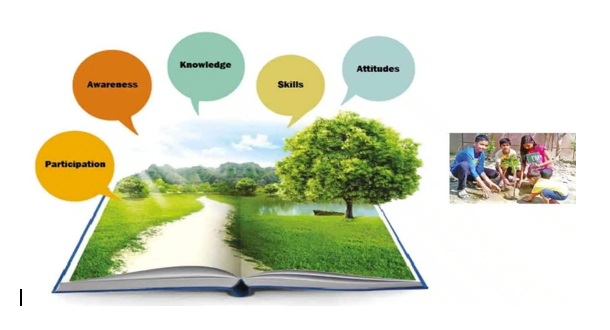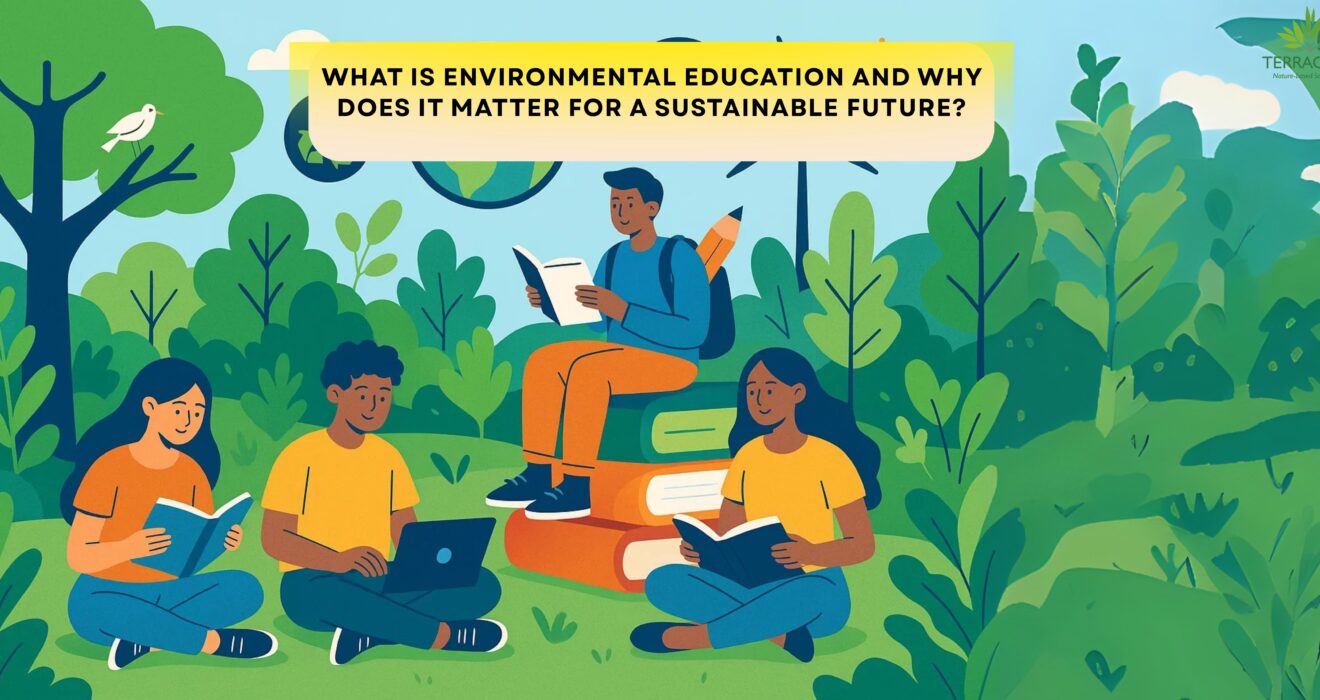There has never been a more pressing need for environmental sustainability in the rapidly changing globe of today. Humanity is confronted with issues that call for a change in mindset and conduct rather than simply new laws or technological advancements, such as the growing effects of climate change and the decreasing availability of natural resources. Environmental education is essential in this situation.
Environmental education and awareness?
The goal of environmental education (EE) is to raise people’s knowledge of environmental challenges, Environmental crises, Environmental issues promote their ability to think thoughtfully, and inspire them to take responsible action in the direction of a sustainable future. By increasing interaction with environment and an awareness of one’s ecological footprint, Biodiversity goes beyond the confines of standard education.

Why Is Education About the Environment Important?
The idea that education can be a vehicle to spread knowledge and help protect the natural environment has gained prominence since the 1960s. As formalized at the world’s first intergovernmental conference on environmental education (Tbilisi Declaration; United Nations Educational, Scientific, and Cultural Organization [UNESCO] & United Nations Environment Programme [UNEP], 1977), the initial goals of environmental education were to foster global public knowledge about environmental issues and increase individuals’ motivation and skills to protect or improve the natural environment.
Environmental Education is vital to winning the fight against climate change. Without it, the leaders, of tomorrow will be ill- equipped to overcome the environmental challenges the world will face. Education is often overlooked in the fight against climate change. While policy change and global commitments are necessary to prevent global warming from further worsening improved education is first step toward achieving our goals.

1. Encourages Understanding and Awareness
People can better understand the intricate connection between humans and the natural environment by using EE. Knowledge of ecosystems, biodiversity, pollution, and climate dynamics helps people better grasp the effects of their decisions.
2. Promotes Sustainability
People who are aware of sustainability concepts are more inclined to embrace eco-friendly behaviors, such as lowering their use of plastic, conserving energy, and promoting regional, sustainable farming.
3. Develops Future Leaders
It is more probable that young students who receive environmental education will support sustainable practices in their communities and careers. A generation of innovators prepared to create a more sustainable society is produced by educational institutions that incorporate environmental thought. EE encourages student leadership, civic engagement, and active learning. It gives young people the confidence to speak up and change their communities and schools. EE assists educators in developing their own environmental expertise and pedagogical abilities.
4. Encourages Participation in Community Events
EE is not limited to school settings. Local conservation initiatives, citizen science initiatives, and community seminars encourage teamwork. These programs enable local communities to come up with unique answers to environmental problems.
5. Motivates Creativity and Policy
More progressive environmental measures are supported by an informed public. Citizens’ voices help shape successful, science-based policy as they gain greater information about topics like climate resiliency, renewable energy, and water conservation.
Environmental education strategies in society

Strategy for environmental education is defined by the Ministry for the Ecological Transition and the Demographic Challenge as “global and integral plans of principles and lines of action, which guide the present and future actions in terms of environmental education of institutions, companies, and collective and individual social agents.”
- Incorporating environmental education into the school curriculum.
- Community environmental education projects.
- Training in companies and organizations.
- Awareness-raising and new technologies.
Climate- Conscious students can also partner with non-governmental organization (NGO’S) like
- WWF
- African Conservation Foundation
- Born Free USA
- Break Free from Plastic.
This NGO’s Tackles the biggest environmental issues today and can put students in a position to maximize their impact their impact and gain important professional development skills.
For people to understand and stop climate change, environmental education is essential. Students who receive a thorough climate education can feel more empowered and be more willing to communicate with advocacy and activist organizations. Students can get the multidisciplinary skills necessary to promote environmental conservation and comprehend the value of stewardship through even little educational experiences, such as taking part in a community clean-up.
By increasing awareness, encouraging responsible conduct, and equipping people to tackle environmental issues, environmental education is essential to creating a sustainable future. It gives people the information, abilities, and drive they need to make wise choices and take action to save the environment.
Positive change can be strongly accelerated by environmental education. It enables people to take responsibility for the environment by promoting awareness, education, and responsible behavior. Let’s pledge to protect the planet’s beauty and vitality for future generations as we acknowledge the interdependence of all life forms and the seriousness of environmental issues.

Environmental education helps promote an understanding of the environment and foster responsible attitudes and behavior towards it. It aims to empower individuals to become environmentally conscious citizens and take actions to mitigate environmental problems. It covers a wide range of topics, including biodiversity, climate change, waste management, energy conservation, and sustainable development. It often involves experiential learning, outdoor activities, and community involvement to help individuals develop a deep connection to nature and recognize the importance of environmental stewardship. (By Dr Mukesh Kwatra)
Environmental education is the key to a sustainable future.
ClimaTalk Contributor, October 29, 2024.
Environmental education is critical for ensuring a sustainable future. By providing individuals and communities with practical skills and a sense of agency, it encourages active citizenship and sustainable practices such as conservation and resource management. Inclusive and equitable environmental education ensures that marginalised groups, who are often the most vulnerable to climate change, have the knowledge and tools they need to build resilience and drive long-term environmental stewardship. (By Rashid Naeem Aziz)
Sustainable development is defined as meeting the needs of the present without compromising the ability of future generations to meet their own needs. Environmental education plays a central role in achieving this balance, equipping individuals with the knowledge, attitudes, and behaviors required to promote sustainability. According to UNESCO, environmental education goes beyond environmental awareness – it fosters critical thinking and problem-solving skills, enabling people to make informed decisions about their environment and resources.

Written By
Amruta Gharpure
Team Terracon Ecotech
Reference :




